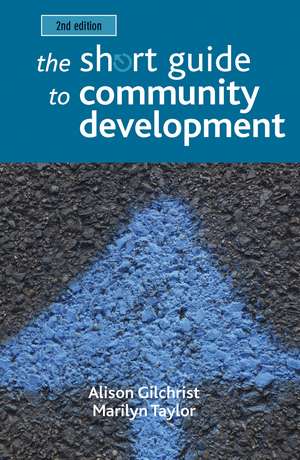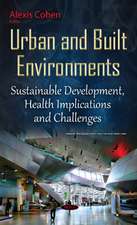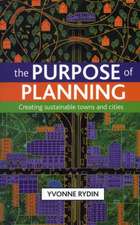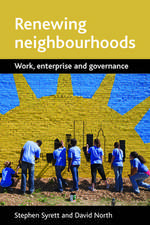The Short Guide to Community Development: Second Edition: Short Guides
Autor Alison Gilchrist, Marilyn Tayloren Limba Engleză Paperback – 29 mar 2016
With the topics of community and how local communities can be supported to take control of their lives, services, and environment still high on the public agenda, this second edition of an invaluable guide provides a timely introduction to community development, its origins, and the different forms it takes. Updated to reflect developments in policy and practices, current trends and challenges, as well as recent debates about the changing nature of community itself, it also shows how community development can be applied in a variety of policy areas. Accessibly written, this guide will remain essential reading for community organizers and students of community development.
Preț: 183.38 lei
Nou
Puncte Express: 275
Preț estimativ în valută:
35.09€ • 36.64$ • 28.98£
35.09€ • 36.64$ • 28.98£
Carte tipărită la comandă
Livrare economică 16-30 aprilie
Preluare comenzi: 021 569.72.76
Specificații
ISBN-13: 9781447327837
ISBN-10: 1447327837
Pagini: 152
Dimensiuni: 127 x 197 x 18 mm
Greutate: 0.2 kg
Ediția:2nd Edition
Editura: Bristol University Press
Colecția Policy Press
Seria Short Guides
ISBN-10: 1447327837
Pagini: 152
Dimensiuni: 127 x 197 x 18 mm
Greutate: 0.2 kg
Ediția:2nd Edition
Editura: Bristol University Press
Colecția Policy Press
Seria Short Guides
Notă biografică
Alison Gilchrist has worked for over three decades in community development as an activist, practitioner, trainer, researcher, and manager, including several years at the Community Development Foundation. She now works as an independent consultant. Marilyn Taylor is a visiting research fellow at the Institute of Voluntary Action Research in the United Kingdom and professor emeritus at the University of the West of England.
Cuprins
List of tables and boxes
1. Introduction
Further reading
2. What is community development?
Underpininning principles and process
Providing help, building on resources
Community development’s core values
An integrated approach
Related models
Brief conclusion
Summary
Further reading
3. The changing policy context
How community policies have developed
Constant themes in community policy
Brief conclusion
Summary
Further reading
4. Theoretical concepts
What theory offers
Theories of community
Psychological concepts and theories
Theories of power: structure or agency?
Organisations and institutions: how agency is organized
Systems and ecological approaches
Social movement theory
Brief conclusion
Summary
Further reading
5. Effective and ethical community development: what’s needed?
Working with people in groups and organisations
Dealing with difficulties
Working with organisations
Networking and engagements
Getting to know the community
Resources and support
Supporting opportunities to learn
Working with volunteers and activists
Communication and knowledge management
Using and influencing policies
Competencies and core values
Brief conclusion
Summary
Further reading
6. Applying community development in different service areas
Environmental action and sustainable development
Economic responses to poverty and social exclusion
Health and wellbeing
Community arts, crafts and culture
Brief conclusion
Summary
Further reading
7. Challenges for practice
Developing a strategic approach
Orientation
Status and recognition
Role boundaries
Community belonging: place and identity?
Equality and diversity
Leadership and representation issues
Accountability
Mainstreaming, targeted or specialist work?
Demonstrating impact: measuring the social return
Professional standards and ethics
Brief conclusion
Summary
Further reading
8. Future prospects
Developments since 2011
Neoliberal globalization
The shrinking state: preserving the public sphere
Redefining community: migration and its significance for place
The digital age
A new politics
Climate change and sustainable development
Bringing it all together
Summary
Further reading
Appendix: Resources
The main community development organisations in the UK
International community development organisations
Opportunities for further study or training
Index
1. Introduction
Further reading
2. What is community development?
Underpininning principles and process
Providing help, building on resources
Community development’s core values
An integrated approach
Related models
Brief conclusion
Summary
Further reading
3. The changing policy context
How community policies have developed
Constant themes in community policy
Brief conclusion
Summary
Further reading
4. Theoretical concepts
What theory offers
Theories of community
Psychological concepts and theories
Theories of power: structure or agency?
Organisations and institutions: how agency is organized
Systems and ecological approaches
Social movement theory
Brief conclusion
Summary
Further reading
5. Effective and ethical community development: what’s needed?
Working with people in groups and organisations
Dealing with difficulties
Working with organisations
Networking and engagements
Getting to know the community
Resources and support
Supporting opportunities to learn
Working with volunteers and activists
Communication and knowledge management
Using and influencing policies
Competencies and core values
Brief conclusion
Summary
Further reading
6. Applying community development in different service areas
Environmental action and sustainable development
Economic responses to poverty and social exclusion
Health and wellbeing
Community arts, crafts and culture
Brief conclusion
Summary
Further reading
7. Challenges for practice
Developing a strategic approach
Orientation
Status and recognition
Role boundaries
Community belonging: place and identity?
Equality and diversity
Leadership and representation issues
Accountability
Mainstreaming, targeted or specialist work?
Demonstrating impact: measuring the social return
Professional standards and ethics
Brief conclusion
Summary
Further reading
8. Future prospects
Developments since 2011
Neoliberal globalization
The shrinking state: preserving the public sphere
Redefining community: migration and its significance for place
The digital age
A new politics
Climate change and sustainable development
Bringing it all together
Summary
Further reading
Appendix: Resources
The main community development organisations in the UK
International community development organisations
Opportunities for further study or training
Index
Recenzii
“Community development has undergone substantial changes in the past five years. This extensively revised edition of the Short Guide captures those changes succinctly and accessibly. Crucially, it poses a number of important challenges for the future of community development values, theory, and practice. Essential reading.”
“Accessible and clear, whilst avoiding oversimplification, The Short Guide to Community Development provides an excellent basis for understanding both the appeal and the difficulty of contemporary community development.”































